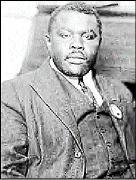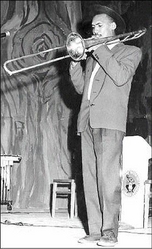Herbie Miller links Garvey and radical Black music
Published: Tuesday | September 1, 2009

Marcus Garvey
Herbie Miller, director/curator of the Jamaica Music Museum, currently based in the Institute of Jamaica, East Street, downtown Kingston, did not have a specific publication in mind when he was writing the article 'Marcus Garvey and the Radical Black Music Tradition'. When it was finished, though, it quickly found space in a journal published by the organisation which had prompted him into writing it in the first place.
The journal is 76 King Street and is the Journal of Liberty Hall: The Legacy of Marcus Garvey. The first edition was launched in early July.
"Donna McFarlane (director/curator of Liberty Hall) had asked me to do one of her Garvey lectures. I told her I wanted to do it on that subject. And so it was really a presentation two years prior to the journal," Miller told The Gleaner. A few adjustments to the audio-visual presentation were required.
Miller was researching music in political and social movements when he encountered a reaction to Garvey's involvement in music. However, while it was well known, it had not been given much attention by academics, so Miller thought "it was something I would flesh out".
That 'fleshing out' utilises 23 pages in 76 King Street, investigates the Harlem Renaissance and various jazz and blues musicians' support of Garvey and the Universal Negro Improvement Association, including after his death in 1940.
Artistic expression

Don Drummond - File
Still, Miller told The Gleaner that not only Garvey, but most of the Black intelligensia of the time (1900 - early 1920s) did not view jazz and blues as music of the highest level of artistic expression. This does not, however, indicate an innate bias, as Miller says "jazz in its formative stage was viewed as pagan, primitive, less than upfull music associated with a mumbo-jumbo type of existence. The same kind of argument going on about dancehall and what it means is the same thing that was going on about jazz". He also pointed out that jazz was accepted in France before becoming popular in the US.
Among the many persons Miller writes about are Sam Manning (a calypsonian from the West Indies), composer, poet and lyricist Andy Razaf, Jamaican poet Claude McKay, Cecil Mack, Louis Armstrong, trumpeter Tommy Morris, Paul Robeson (more closely aligned to the National Association for the Advancement of Coloured People), Coleman Hawkins, Duke Ellington, 'Empress of the Blues' Bessie Smith, Hazel Scott, Fats Waller and Jewish schoolteacher Abel Meeropol who wrote Strange Fruit (made popular by Billie Holiday and later Nina Simone) under the name Lewis Allen.
Miller also writes that "jazz drummer, activist and scholar Max Roach deserves special mention in any discussion of music, race and political struggle".
While Miller told The Gleaner those who supported Garvey and advocated for Black people "did not lose any work over it", Columbia Records refused to record Billie Holiday singing Strange Fruit, instead loaning her to Commodore in 1939 to facilitate that recording. In addition, Columbia rejected jazz bassist, bandleader and composer Charles Mingus' Fables of Fabus more than 20 years later, Mingus teaming with Max Roach to form their own label and release the recording.
Columbia did not face any repercussions. However, in later years, many musicians and performers did. Miller writes, "some extended that embrace to an involvement with Black nationalist philosophies well into the late 20th century, even at the cost of their careers. Jazz musicians Max Roach, Archie Shepp, Charles Mingus, Charlie Haden, Randy Weston and countless others were released from recording contracts and concert bookings after making bold socio/political musical, verbal and activist statements. These are musicians who understood Garvey's mission and committed themselves to active roles in the Civil Rights struggle."
Some of the lyrics penned in support of Garvey and Black struggles took the direct approach, instead of utilising nuances and subtlety. Miller said it was a deliberate choice, as "writers of the period could present themselves in any way they wanted".
Miller is not finished with 'Marcus Garvey and the Radical Black Music Tradition' as a second part, dealing with the musicians and performers in Jamaica, who have promoted and supported Garvey's work and his principles, is in the making. Among those to be included are Don Drummond, Tommy McCook, Culture, Burning Spear, Big Youth, Peter Tosh and Bob Marley.

Herbie Miller - Contributed
























